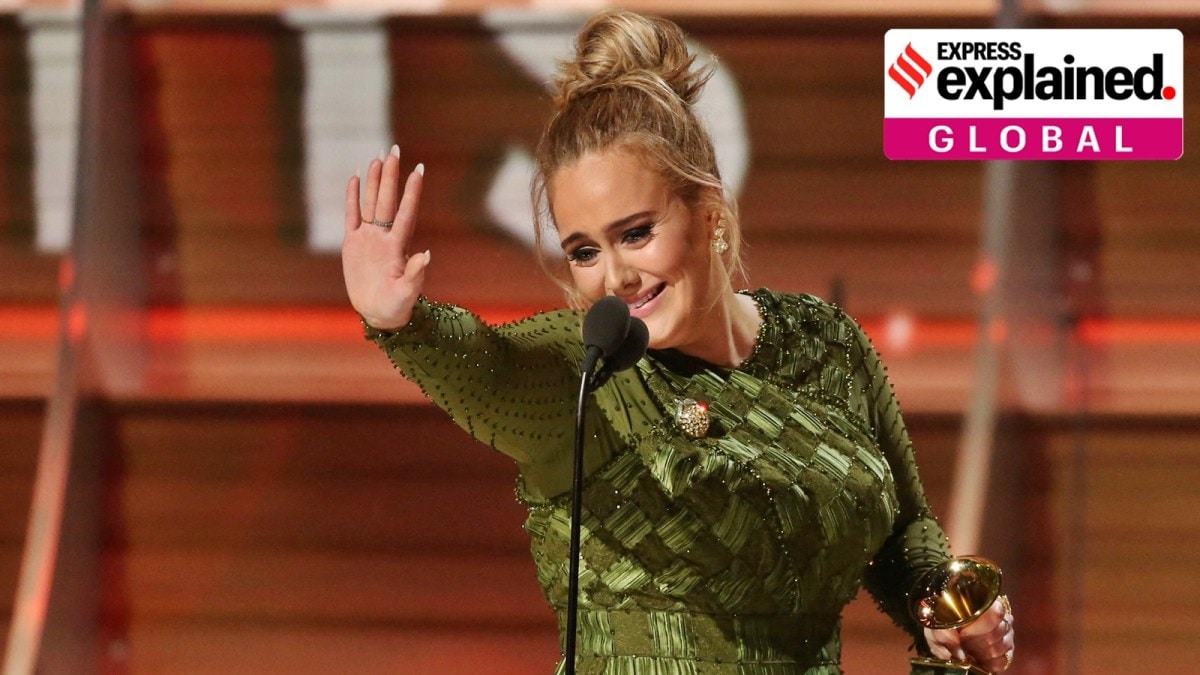Explained: The plagiarism case against Adele, larger questions on copyright in music
Other famous singers, such as Dua Lipa, Pharrell and George Harrison have also been accused of plagiarism in their songs. What is the underlying logic of copyright protection in music? We explain.

A Brazilian court last week ordered British singer Adele’s 2015 song ‘Million Years Ago’ to be removed from streaming services worldwide over an ongoing plagiarism claim by Brazilian composer Toninho Geraes.
The order threatens the Brazilian subsidiaries of music companies Sony and Universal, which represent Adele, with a fine of $8,000 “per act of non-compliance.” Although, as of Friday (December 20), the song was still available on the music streaming platform Spotify, and the order can be challenged in a higher court.
What exactly is the claim and why are such copyright-related lawsuits common in the music industry, from Dua Lipa’s 2020 hit ‘Levitating’ and going all the way back to George Harrison’s ‘My Sweet Lord’ in 1970? We explain.
What is the copyright case against Adele?
In 2021, Geraes sued Adele for plagiarising the melody of his samba song ‘Mulheres’ (Women), released in 1995 and performed by Brazilian singer Martinho da Vila. He is suing for lost royalties, $160,000 in moral damages, and a songwriting credit on Adele’s track.
“It is a landmark for Brazilian music, which… has often been copied to compose successful international hits,” Geraes’ lawyer Fredimio Trotta, told AFP, adding it could set a precedent.
This is also not the first time Adele has faced plagiarism accusations over the song. Fans of Kurdish singer Ahmet Kaya compared it to his 1985 hit ‘Acilara Tutunmak’.
How does copyright protection work?
The concept of copyright is straightforward: it is a type of intellectual property that bestows the author of a piece of work – be it literary, artistic, or music – with protection against its unauthorised use. It allows the owner to take legal action or seek damages against infringement.
However, there are limits to the ambit of copyright protection under the Bern Convention of the World Intellectual Property Organisation (WIPO), a specialised UN agency. Copyright protection extends only to “expressions” and “not to ideas, procedures, methods of operation or mathematical concepts”. Brazil is a signatory to the convention. It introduces copyright protection the minute a work is “fixed” – meaning it tangibly exists – and automatically guarantees its author entitlement to all copyrights on the work and its derivatives.
Members of the World Trade Organisation (WTO), including Brazil, are also signatories to the Agreement on Trade-Related Aspects of Intellectual Property Rights (TRIPS), which virtually enforces the convention’s terms on countries not currently a party to it.
Larger question on music plagiarism
In the paper “Court decisions on music plagiarism and the predictive value of similarity algorithms”, authors Daniel Müllensiefen and Marc Pendzich identified the “classical” conditions of copyright infringement in music, including unauthorised use of:
- a copyrighted work e.g. as a short or extensive digital sample;
- a sound recording in a motion picture film or an advertisement;
- a copyrighted arrangement of a public-domain song;
- a too-similar rewrite of a musical work.
Writing in Forbes, Heather Antoine, a trademark & brand protection professional, said “To prove copyright infringement, the plaintiff must show (1) that the defendant had access to the plaintiff’s work and (2) that the defendant’s work is substantially similar to protected aspects of the plaintiff’s work.”
Dua Lipa, for instance, successfully had a copyright case against ‘Levitating’ dismissed by court in 2023, after it said the plaintiff group Artikal Sound System failed to argue the writers of ‘Levitating’ ever had access to their 2017 song ‘Live Your Life’.
Antoine added, “Lay people may not hear pitch, timing, or harmonic context. They may hear the chords and vocals though. Music is incredibly complex, as are the protectable and, importantly, not protectable elements (such as common ideas). This is one of the reasons forensic musicologists often take the center role in these cases.”
According to a 2021 BBC Brasil report, Geraes’ team established through an “expert analysis” that ‘Million Years Ago’ had copied 88% of his song’s melody. Brazilian news website G1 reported that Judge Torres’ decision relied on “the presentation of robust evidence, such as melodic overlap, technical analyses of sound waves (waveforms) and expert opinions, in addition to the judge’s personal judgment upon listening to the two songs and noting relevant similarities.”
The paper further analysed how different US courts have ruled on plagiarism cases. In the case of George Harrison, it notes that his song ‘My Sweet Lord’ and ‘He’s So Fine’ by The Chiffons (the plaintiff’s song) were “Already relatively similar regarding the more unspecific musical features”. However, it was a “single grace note in the main melody that confirmed the fact that it was undoubtedly take over from the initial work.”
The song also played in 1963 across most British radio stations, “so the access to the musical work was evident. The alleged fact that the defendant was unconscious of using the piece was not accepted as a reason to consider this a fair use.” Therefore, the court ordered Harrison to pay for the use of “unauthorised derivative work”.
Another landmark case was in 2015, when American musicians Robin Thicke and Pharrell Williams were held guilty of copying Martin Gaye’s 1977 song ‘Got to Give It Up’ in making their hit 2013 track ‘Blurred Lines’. However, this case “shocked many legal experts — and musicians — who believed that Mr. Thicke and Mr. Williams were being penalized for using basic musical building blocks, like harmonies and rhythmic patterns, that had long been considered free for any musician to use,” The New York Times had reported.